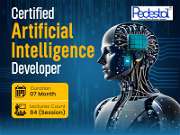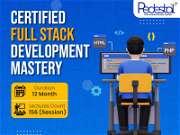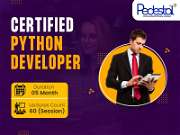CERTIFIED ARTIFICIAL INTELLIGENCE DEVELOPER | CAID
This course on Artificial Intelligence (AI) and Machine Learning (ML) provides in-depth theoretical knowledge coupled with extensive practical learning experiences, through hands-on exercises and proj...
- All levels
- English

Course Description
This course on Artificial Intelligence (AI) and Machine Learning (ML) provides in-depth theoretical knowledge coupled with extensive practical learning experiences, through hands-on exercises and projects. Participants will gain proficiency in AI and ML techniques, learn to implement algorithms using Python programming and utilize industry-standard tools and software for real-world applications....
This course on Artificial Intelligence (AI) and Machine Learning (ML) provides in-depth theoretical knowledge coupled with extensive practical learning experiences, through hands-on exercises and projects. Participants will gain proficiency in AI and ML techniques, learn to implement algorithms using Python programming and utilize industry-standard tools and software for real-world applications.
TOOLS:
• Python
• IDE
• Jupyter Notebooks
• PyCharm
• NumPy Pandas
• Matplotlib
• Scikit-learn
• TensorFlow or PyTorch
CERTIFICATION:
• Upon successful completion of the course and capstone & live project, participants will receive a certification in artificial Intelligence and Machine Learning with Pedestal Certification
TIME COMMITMENT:
10-12 Hrs./ Week
3 Days/Week
See more See lessWhat you’ll learn
- Python Fundamentals Programming
- Machine Learning Fundamentals
- Artificial Intelligence Fundamentals
- Deep Learning and Neural Networks
- Natural Language Processing (NLP)
- Real World AI Applications
- Case Studies
- Pre Interview Preparation
- Live Project
Covering Topics | Program Insights
Week 1-2: Introduction to AI and ML
Week 3-5: Python Fundamentals for AI & ML
Week 6-9: Supervised Learning
Week 10-12: Unsupervised Learning
Week 13-15: Deep Learning and Neural Networks
Week 16-18: Natural Language Processing (NLP)
Week 19-21: Reinforcement Learning
Week 22-25: Real-World Applications of AI & ML
Week 26-28: Capstone and Live Project
Curriculum
Frequently Asked Questions
This course includes
- Lectures 84
- Month 7 Month
- Language Hinglish
- Certificate Yes
Education Provider
More Courses

CERTIFIED ARTIFICIAL INTE.
- ₹ 94545

Certified Full Stack Deve.
- ₹ 89493

CERTIFIED DIGITAL MARKETI.
- ₹ 31499

CERTIFICATION DIGITAL MAR.
- ₹ 125003

CERTIFIED PYTHON DEVELOPE.
- ₹ 39996
